Can I Use Beef Dripping to Make Sausages
Traditional Scottish Stovies Recipe (Plus Variations!)
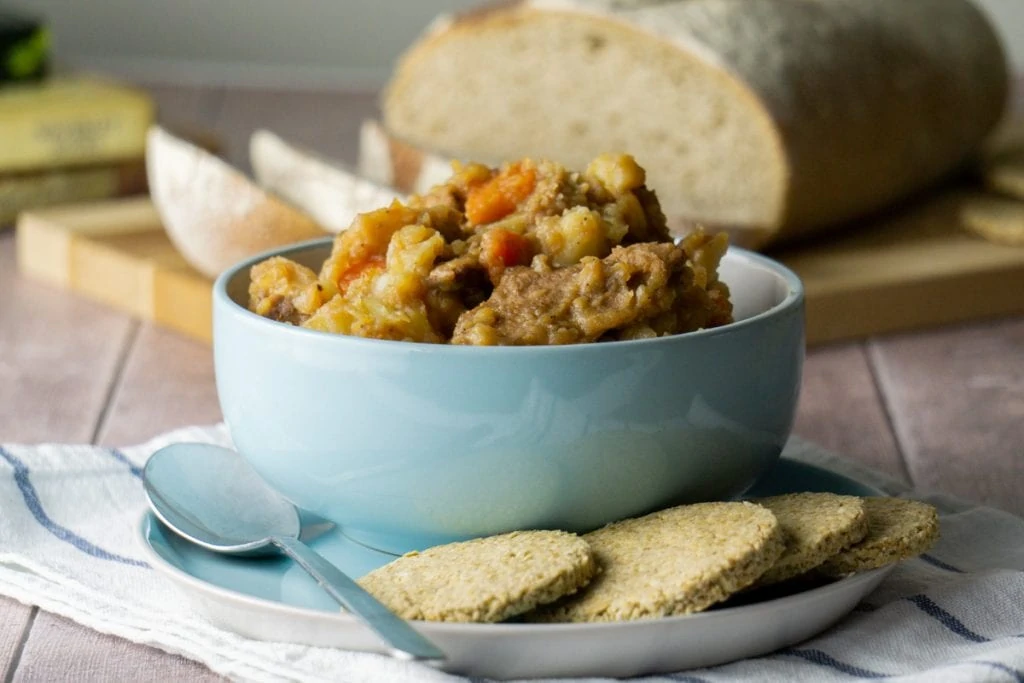
Who knew Stovies are considered the ultimate Scottish food by so many?! With such a wide range of Scottish dishes available, we've been astounded at the number of times we've been asked how to make traditional Scottish Stovies!

It turns out that Stovies are a nostalgic favourite of many, but the recipe differs from family to family, and many people have fond memories of the version that their Mother or Granny made. So, the biggest problem we faced when asked by everyone how to make them? Offending someone's granny because everyone's recipe is different!
As usual, we dove headfirst into as many old recipe books as we could, researching Stovies to try and find the most traditional recipe that we could, and then made adjustments based on what we've learned from friends and family (and you guys!) too.
While the basic premise of frying off an onion in fat, covering with potatoes and stock or gravy, then allowing it all to simmer away on the stove seems to be the same, it's the rest of the ingredients that can differ hugely. There is leftover Beef Roast Stovies, Sausage Stovies, Corned Beef Stovies and Vegetarian Stovies recipes, to name but a few!
And all are correct, delicious and all have their place in our Stovies post, but where to start?
Traditionally Stovies likely didn't even include meat, but just beef or lamb dripping or fat from a roast that could be bought to give the potatoes and onion a meaty flavour. Later on leftover meat from mutton or beef roast would also have been added, and now people often buy meat specifically for Stovies, like sausages or corned beef.
Since we were having a delicious beef roast one Sunday, we decided to use the leftovers to make Beef Stovies! we added in a carrot (controversially) to give it some colour and a little different flavour as well, but otherwise stuck to the traditional method with our Stovies recipe as you can see below.
Pin for later!

But let's get a bit more into what exactly Stovies are first!
What are Stovies?
Stovies is a popular Scottish dish made of potatoes, onions and, traditionally, leftover roast meat with beef dripping. It's the ideal dish to use up leftovers and ensure there is as little wastage as possible.
The finished dish comes out as a blend of potatoes, other vegetables and the meat of your choice, all boiled together with some stock and seasoning that help Scottish Stovies burst with flavour and make the perfect comfort food.
This was generally a Monday sort of dish, made with the leftover bits from a Sunday roast and turns out a bit like a potato stew, but of course, you can make it any day of the week!
Like many of the dishes we have recreated, Stovies began life trying to reduce wastage and save money, similar to Cullen Skink and Tattie Scones. All of these dishes have been created through necessity, when times were hard, to make sure everything that could be was used. Now all of these dishes are made for the love of them because they're all so tasty and they remind people of home and growing up.

When were Stovies first made?
This is the impossible question! Stovies are such a simple dish made with common ingredients so there is no recorded history as such. It is believed that potatoes were introduced to Britain at the end of the 16th century so they're likely to be as old as this, made using whatever scraps were available at the time.
Variations of leftover recipes can be found in every country. For example, the English have Bubble and Squeak, the Welsh have Cawl, and the Irish have Colcannon.
And so in Scotland, we have Stovies, with every family having their own recipe stretching back who knows how long!
Since starting Scran we've been asked numerous times for a Scottish Stovies recipe because a grandmother/mother or other relative used to make them for the person when they were little.
Well, here's our new family recipe plus a few variations provided to us by the Scottish Scran Facebook Group.
As always, we've tried to stay as traditional as possible so we've used leftovers from a roast dinner as a key part to our Stovies recipe. We think its better if as much as possible can come from a roast dinner to add a depth of flavour to the dish.

Things you'll need to make Stovies
- Large pan or frying pan
- Measuring jug
- Spoon
- Knife and chopping board
Ingredients for Stovies
- 250g (8.8oz) Roast Beef from previous days roast or meat of your choice (see variations)
- 900g (2lb) Roast Potatoes from previous days roast, make up any difference with raw potatoes
- 50g (304 tbsp) Beef Dripping saved from previous days roast, or butter, oil, dripping or lard
- 400ml (2 cups) Stock or leftover gravy with water added to make up the difference. We used OXO cubes.
- 2-3 tbsp Beef Jelly from previous days roast *Optional – If you put the Beef fat from the roast into a container and leave to cool overnight it will separate out into dripping and meat jelly
- Other vegetables (from previous days roast) or 2 large raw carrots
- 1 Large Onion

How to Make Stovies – Step by step method
Stovies is all about bringing together delicious flavours from a leftover roast to boil away on the stovetop.
Start by dicing the onion and any peel and chop any extra potatoes you might need, plus a carrot if using. It's best to use as many leftover roast potatoes as you can so always cook some extras!

Roughly dice your beef or substitute meat like sausages. You can see our variations below for some different ideas. Some people also use sausages to make up the difference if you need extra meat.
Add Beef dripping or a substitute fat to a large hot pan, see our variations about this too! You can use butter, olive oil, or lard.
Add the onion to the hot fat in a layer at the bottom of the pan, allow them to change colour but not to brown.
Add the diced meat to the pan on top of the onions once they begin to change colour. Stir together. Note: If using Corned Beef then add at the end and stir through to warm up other than at this point.
Add potatoes and any other vegetables to the mix, on top of the meat but do not stir together.
If required make up your stock, adding the beef jelly (this is what separates from the dripping if you leave to cool after having a roast) to the mix and stirring to combine.
Pour the stock into the pot. It should come to just below the top layer of vegetables so add more or less as necessary. Do not stir but leave everything in layers.
Bring to the boil and once boiling turn down to a low simmer and cover.
Cook for 45 mins-60 minutes until the potatoes begin to soften and break down. Test them with a knife to see if they're ready.
Season with salt and pepper. Only stir at this point, so that the onion caramelises and the potatoes break down when you stir. The idea is to have some nice crispy bits on the bottom, and for some but not all of the potatoes to break down. New potatoes will break down more than roast ones which is why it's nice to have lots of roast potatoes in it too!
Serve with oatcakes or crusty bread.
Variations for Stovies
Gravy: Use leftover gravy instead of stock. You will want to use water to thin it out a little or top-up to the 400ml.
Marmite: Some people like to add a little marmite to the stock mix for an extra flavour
Beer: You can add around 4-6 tablespoons of a dark beer once the onions have fried and cook for a few minutes to allow the alcohol to burn off before continuing with the rest of the recipe. This will add another additional layer of flavour.

Corned Beef Stovies
Corned Beef Stovies have also proved popular when we've surveyed our Facebook Group members about how they make their Stovies. Tinned Corned Beef is readily available and a pantry staple for some, so it's easy to see why it would act as another meat option for Stovies.
Since the meat is already cooked and shredded you can add it when the potatoes are cooked and stir through to warm it up.
Sausage Stovies
Many people swear by making their Stovies with sausage. This could be sliced sausages, sausage meat, or cut up square sausage (Lorne Sausage – recipe here). You can add these at the beginning just after the onions to allow some of the fat to come out and flavour the dish.
If you don't have enough leftover roast meat these are a great addition.
Vegetarian Stovies
It is entirely possible to make Vegetarian Stovies or even Vegan Stovies! The simplest way is just to omit the meat and use a vegetarian/vegan version of fat like olive oil or butter/vegan butter alternative and vegetable stock.
Make sure any leftover roast vegetables haven't been cooked in meat fat though!
You can also add vegetarian sausages or another meat alternative. Chop and add around 10-15 minutes from the end of cooking to allow them to cook through.
However you make your stovies, they're a delicious and heartwarming meal. It's often served with crusty bread or oatcakes (try our easy homemade oatcakes, they can be made while you wait for the Stovies to cook!).
The best thing about a stovies recipe is that everyone will have their own take on it, with their own memories of the dish or favourite way of doing it. Let us know if you try something different!
Prep Time 10 minutes
Cook Time 1 hour
Total Time 1 hour 10 minutes
Ingredients
- 250g (8.8oz) Roast Beef from previous days roast or meat of your choice (see notes for variations)
- 900g (2lb) Roast Potatoes from previous days roast, make up any difference with raw potatoes
- 50g (3-4 tbsp) Beef Dripping saved from previous days roast, or butter, oil, dripping or lard
- 400ml (2 cups) Stock or leftover gravy with water added to make up the difference. We used OXO cubes.
- 2-3 tbsp Beef Jelly from previous days roast *Optional - If you put the Beef fat from the roast into a container and leave to cool overnight it will separate out into dripping and meat jelly
- Other vegetables (from previous days roast) or 2 large raw carrots
- 1 Large Onion
Instructions
- Dice the onion and any peel and chop any extra potatoes you might need, plus a carrot if using.
- Roughly dice your beef or a substitute meat like sausages.
- Add Beef dripping or a substitute fat to a large hot pan.
- Add the onion to the hot fat in a layer, allow them to change colour but not to brown.
- Add the diced meat to the pan as a layer on top of the onions once they begin to change colour. Stir together. Note: If using Corned Beef then add at the end and stir through to warm up other than at this point.
- Add potatoes and any other vegetables to the mix, on top of the meat but do not stir together.
- If required make up your stock, adding the beef jelly to the mix and stirring to combine.
- Pour the stock into the pot. It should come to just below the top layer of vegetables so add more or less as necessary. Do not stir but leave everything in layers.
- Bring to the boil
- Once boiling turn down to a low simmer and cover.
- Cook for 45-60 minutes until the potatoes begin to soften and break down. Test them with a knife to see if they're ready.
- Season with salt and pepper. Only stir at this point, so that the onion caramelises and the potatoes break down when you stir.
- Serve with oatcakes or crusty bread.
Notes
Variations:
Gravy: Use leftover gravy instead of stock. You will want to use water to thin it out a little or top-up to the 400ml.
Marmite: Some people like to add a little marmite to the stock mix for an extra flavour
Beer: You can add around 4-6 tablespoons of a dark beer once the onions have fried and cook for a few minutes to allow the alcohol to burn off before continuing with the rest of the recipe. This will add another additional layer of flavour.
Meat: You can use leftover roast meat of any sort, and top up with sausage meat if you don't have enough. It's also possible to make entirely with sausage meat, using either ground sausage, square sausage cut up, or sliced sausages. These should all be added at the beginning after the onion. If you want to use Corned Beef instead add the at the end when the potatoes are done and stir through to warm up.
Fat: You can use any sort of fat you like, but the most flavoursome is the leftovers from a roast dinner. Save this in a dish overnight and it should separate into "dripping" and "meat jelly". You can use the dripping as fat and the meat jelly can be stirred into the stock for extra flavour. However, you can also opt for butter, olive oil, or lard.
Vegetarian/Vegan Stovies: Yes, it's possible! Use a vegetarian or vegan fat like a butter alternative and a vegetable stock. You can have it with just vegetables like potatoes and any others you may want to add (turnip/swede for instance) or use a vegetarian sausage or other meat alternative which can be stirred through at the end to warm up.
Nutrition Information:
Yield:
6 Serving Size:
1
Amount Per Serving: Calories: 550 Total Fat: 33g Saturated Fat: 13g Trans Fat: 0g Unsaturated Fat: 16g Cholesterol: 154mg Sodium: 150mg Carbohydrates: 21g Fiber: 2g Sugar: 6g Protein: 41g
The nutritional data in this recipe is provided by a third party and these values are automatically calculated and offered for guidance only. Their accuracy is not guaranteed.
christensenaladvid.blogspot.com
Source: https://scottishscran.com/how-to-make-stovies-recipe/

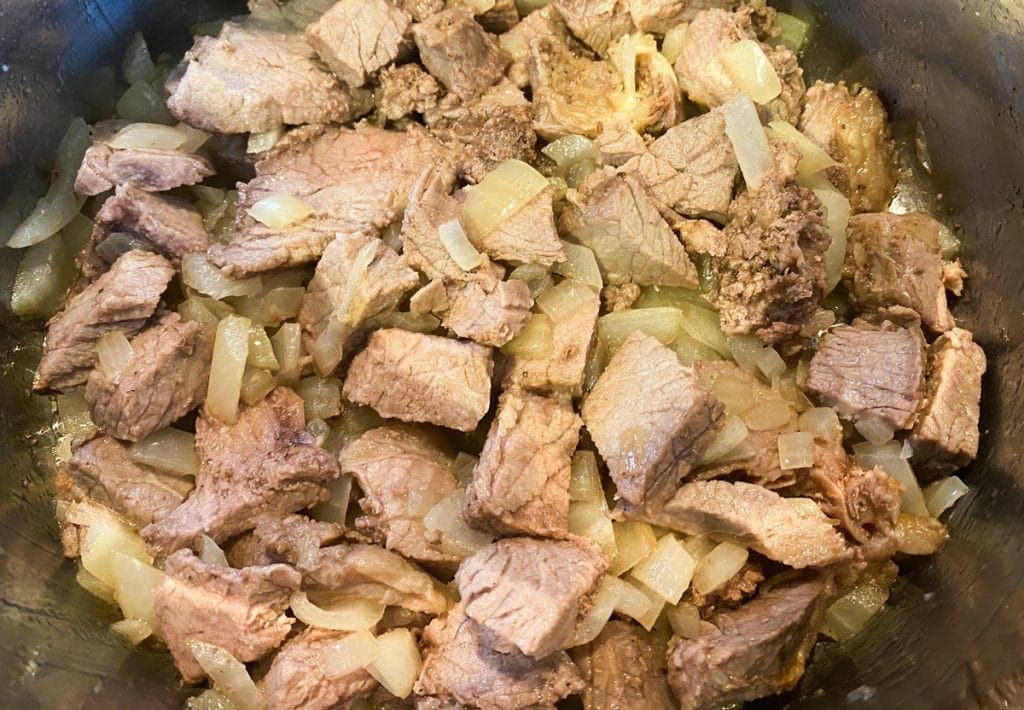
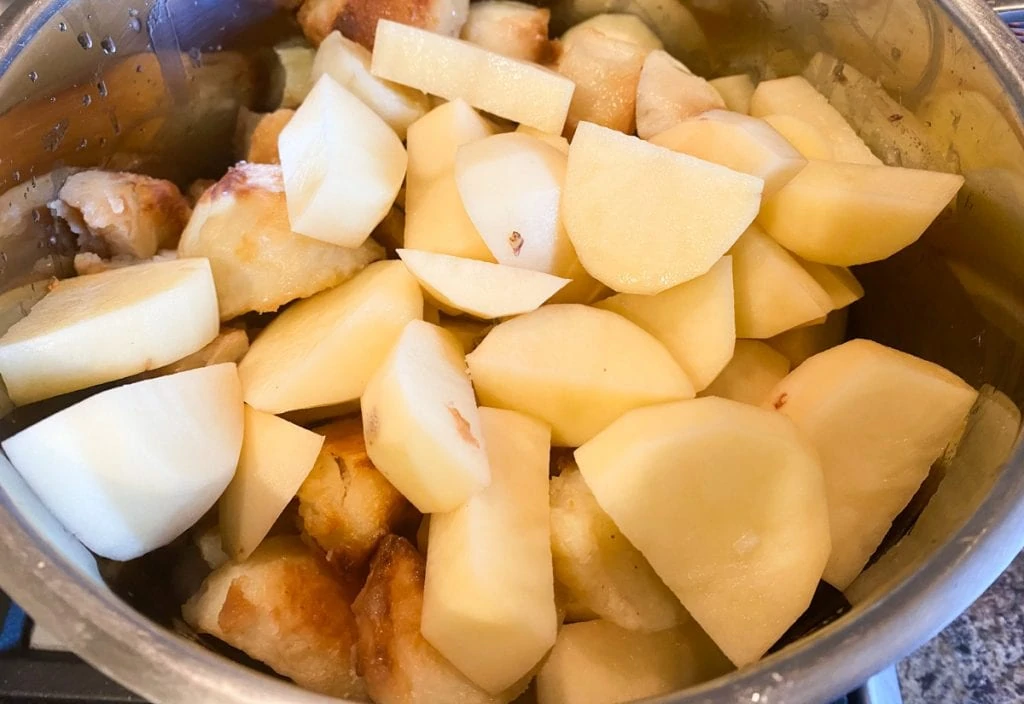
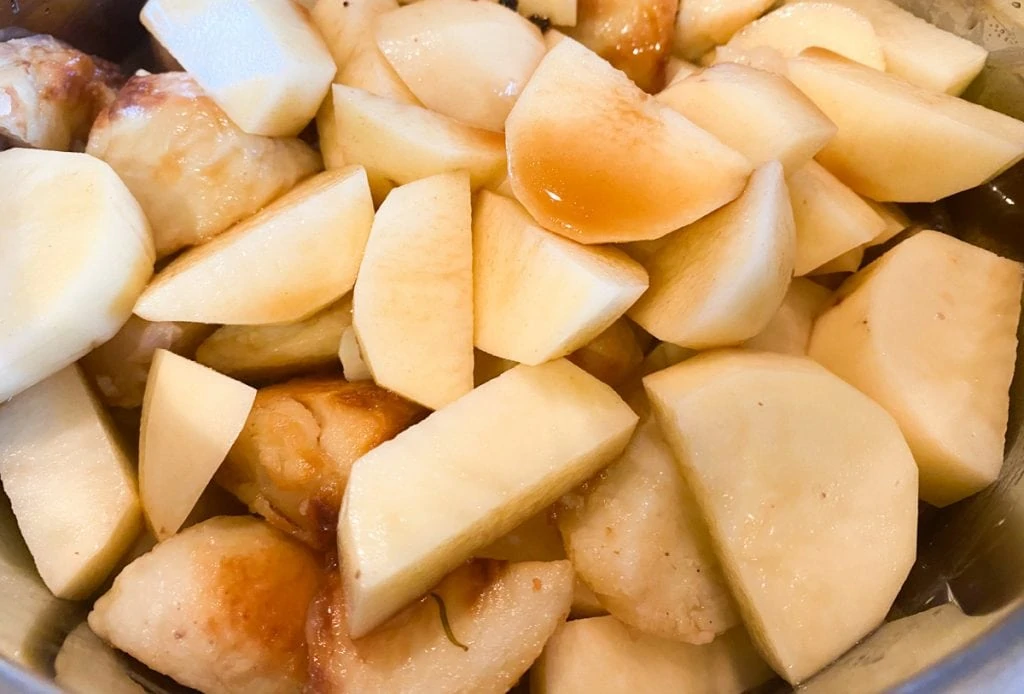
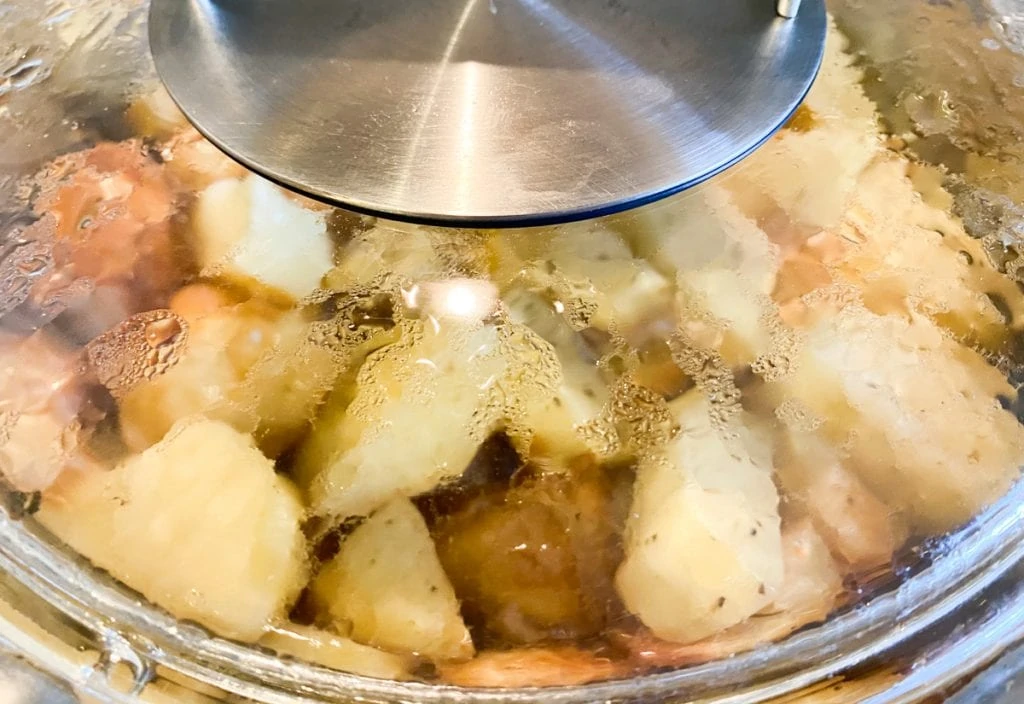
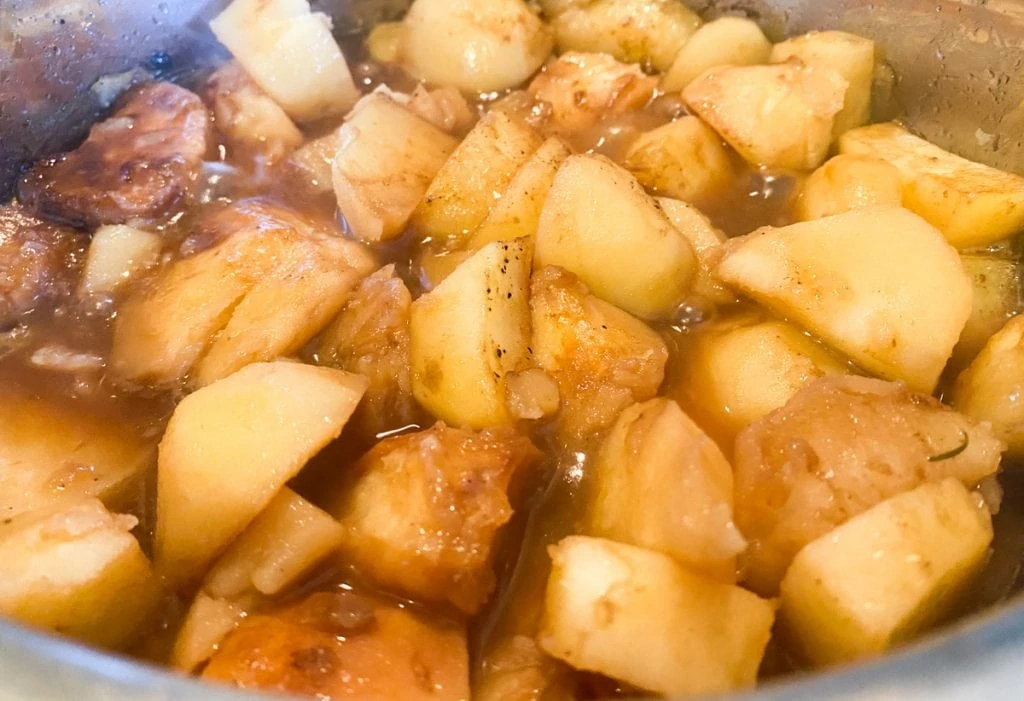
0 Response to "Can I Use Beef Dripping to Make Sausages"
Post a Comment